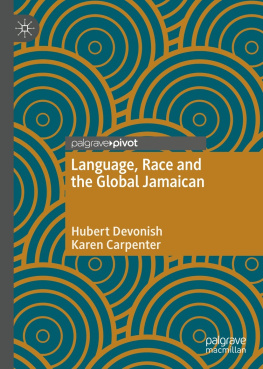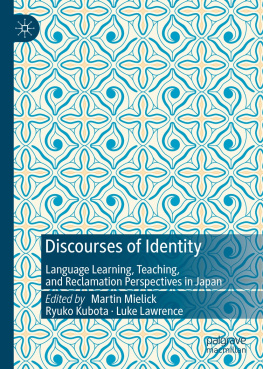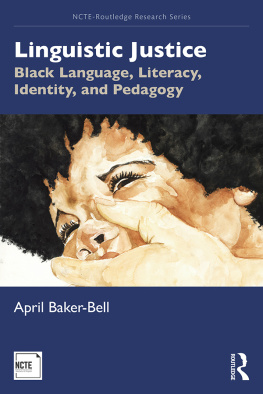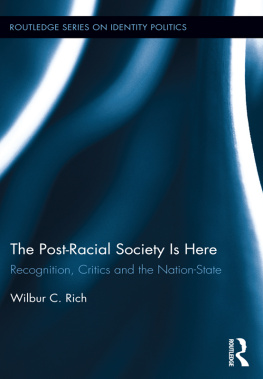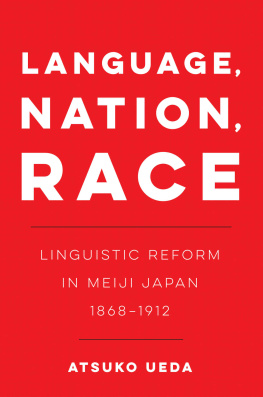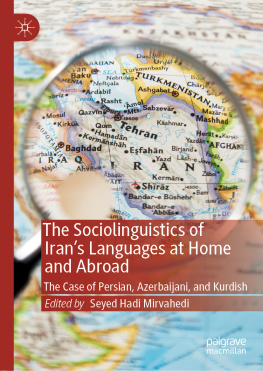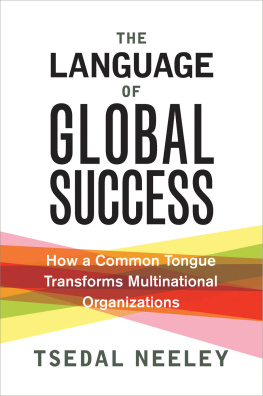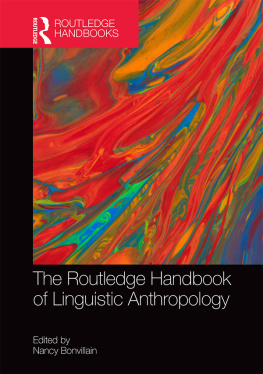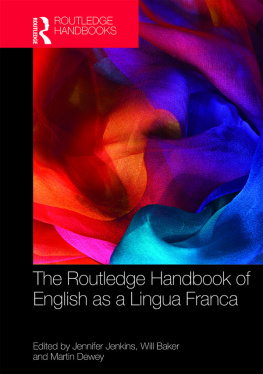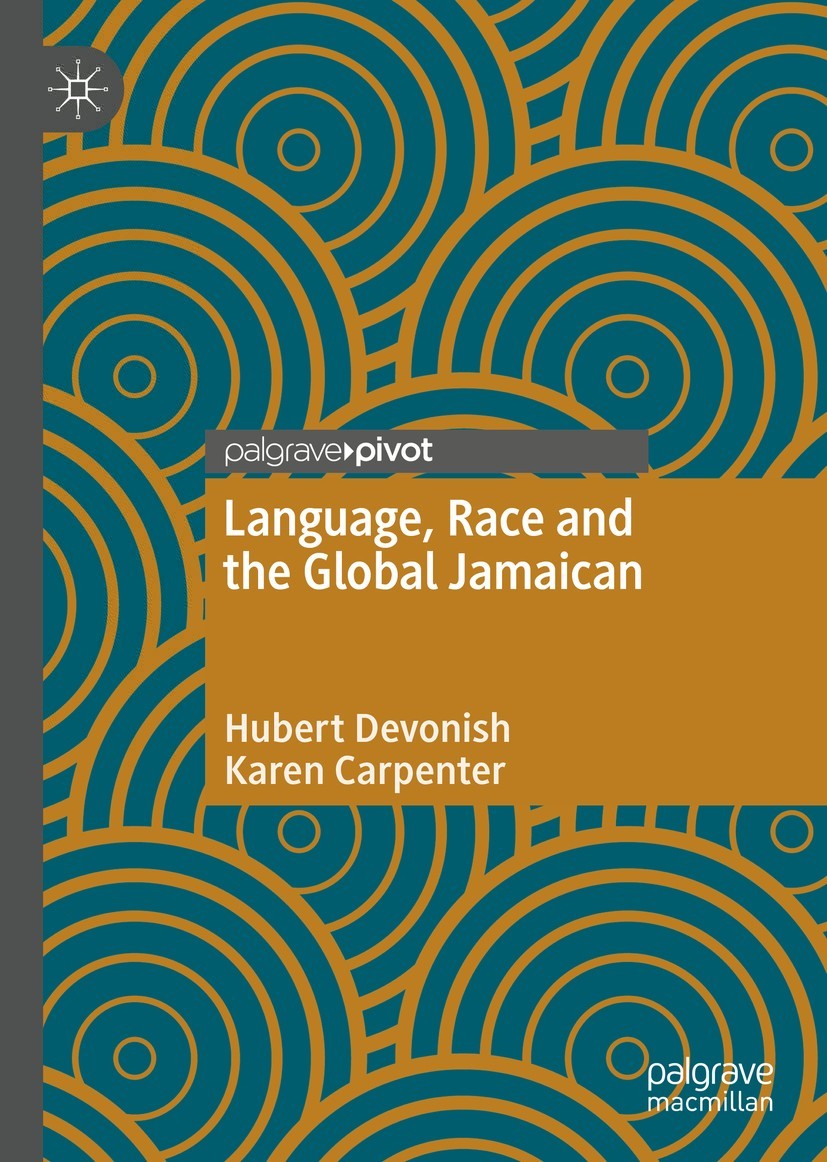Hubert Devonish and Karen Carpenter
Language, Race and the Global Jamaican
Hubert Devonish
Department of Language Linguistics & Philosophy, University of the West Indies, Mona, Jamaica
Karen Carpenter
Caribbean Sexuality Research Group, Kingston, Jamaica
ISBN 978-3-030-45747-1 e-ISBN 978-3-030-45748-8
https://doi.org/10.1007/978-3-030-45748-8
The Editor(s) (if applicable) and The Author(s) 2020
This work is subject to copyright. All rights are reserved by the Publisher, whether the whole or part of the material is concerned, specifically the rights of translation, reprinting, reuse of illustrations, recitation, broadcasting, reproduction on microfilms or in any other physical way, and transmission or information storage and retrieval, electronic adaptation, computer software, or by similar or dissimilar methodology now known or hereafter developed.
The use of general descriptive names, registered names, trademarks, service marks, etc. in this publication does not imply, even in the absence of a specific statement, that such names are exempt from the relevant protective laws and regulations and therefore free for general use.
The publisher, the authors and the editors are safe to assume that the advice and information in this book are believed to be true and accurate at the date of publication. Neither the publisher nor the authors or the editors give a warranty, expressed or implied, with respect to the material contained herein or for any errors or omissions that may have been made. The publisher remains neutral with regard to jurisdictional claims in published maps and institutional affiliations.
This Palgrave Macmillan imprint is published by the registered company Springer Nature Switzerland AG.
The registered company address is: Gewerbestrasse 11, 6330 Cham, Switzerland
Preface
The manuscript had been completed and we were doing a due diligence search for any recent work in our area of interest. Out popped a November 13, 2019, New York Times review of a just published book by Jamaican Harvard-based sociologist and historian, Orlando Patterson, Jamaica: A Small Nation with an Outsize Global Influence. We werent the only people obsessed with the question of the reasons for the unexpectedly powerful influence of Jamaica around the globe. We werent either the only people seeking for answers in history and the relationship between Barbados and Jamaica. From the review, we gathered that the book expressed admiration for the people of Jamaica, their cultural and sporting achievements. It sought to address the question of why, in spite of the great achievements of Jamaica and Jamaicans, at the level of economics and criminal violence, it has done so badly since independence. The comparison was with Barbados which, from similar beginnings as a British former sugar colony, has a per capita GDP which is double that of Jamaica and very much lower levels of violence. This approach to the Jamaica phenomenon is one of Why in spite of?
There is an alternative approach to the same issue and potentially a more optimistic approach to the issue of Jamaicas outsized global influence. This can be seen in an August 5, 2012, article by Tom Horan in the UK Guardian newspaper in celebration of the fiftieth anniversary of Jamaican independence. Here, Jamaica is compared with many other countries similar in area and in population and the question asked is, Why have these nations not produced a culture that transformed the way the entire world makes and listens to music? Why are their dialects not the lingua franca of an entire generation of young people?
Horans article makes historical connections. There are the tremendous riches produced by Jamaica in the eighteenth and nineteenth centuries from sugar produced by the labour of enslaved Africans. His article links this with the massive wealth generated by a descendant of the slave owning group, Chris Blackwell, through his company, Island Records, from the marketing and sale of cultural products generated by the descendants of enslaved Jamaicans, most famously Bob Marley.
A focus, as in the Guardian article, on the economic value of Jamaican language, music and culture, opens up a different question, that of How to? This is what drives us as authors who live in Jamaica and who have lived through many of the developments which have given Jamaica its global impact. Faced with the scourge of economic inequality, widespread poverty and criminal violence in Jamaica, our interest is in how the global influence and economic value of Jamaicas language and cultural products can be used to create an economically prosperous, socially just and peaceful society. To answer How to do this?, however, first we have to answer, How the situation came to be? The present work tries to answer this baseline question with a view to making the answer to the How to? easier to arrive at.
Hubert Devonish
Karen Carpenter
Mona, Jamaica Kingston, Jamaica
Contents
List of Tables
The Author(s) 2020
H. Devonish, K. Carpenter Language, Race and the Global Jamaican https://doi.org/10.1007/978-3-030-45748-8_1
1. Jamaica to the World
Hubert Devonish
(1)
Department of Language, Linguistics & Philosophy, University of the West Indies, Mona, Jamaica
(2)
Caribbean Sexuality Research Group, Kingston, Jamaica
Hubert Devonish (Corresponding author)
Email:
Karen Carpenter
Abstract
It is the thirteenth session of the UNESCOs Intergovernmental Committee for the Safeguarding of the Intangible Cultural Heritage of Humanity. The inscription of the Reggae Music of Jamaica on the UNESCO Representative List of the Intangible Heritage of Mankind creates a clear and identifiable link between Jamaica, on the one hand, and Reggae Music which it created, on the other. The Jamaican manoeuvre functions as a means of blocking appropriation and ensuring that all makers of reggae music function as imitators of Jamaican genres or adopters/adapters of the genre, but never as owners or originators of the music. This attempt by the Jamaican state to get a birth certificate and declaration of paternity for reggae is very well thought through.
Keywords
Reggae music UNESCO Intangible heritage Jamaican state
The One Love Moment
Zambia, Philippines, Kyrgyzstan, Colombia, Armenia, Palestine, Kuwait, China, Mauritius, Azerbaijan, Cameroons and Lebanon, intones the chairman, H.E. Mr. Prithvirajsing Roopun. At the end of the list of states voting in favour. Then he says, I declare decision 13.COM.10b.18 duly adopted. The overhead screen on to which the text of the proposal before the committee is being projected changes. We now see added next to the heading Draft decision, in bold red letters as if sub-titling his voice, adopted ( UNESCO )
It is the thirteenth session of the UNESCOs Intergovernmental Committee for the Safeguarding of the Intangible Cultural Heritage of Humanity. This is Port-Louis, the capital of the Republic of Mauritius, and it is November 19, 2019. The decision concerns Nomination File No. 01398, for the inscription of The Reggae Music of Jamaica on the Representative List of the Intangible Cultural Heritage of Humanity, under the Convention for the Safeguarding of the Intangible Cultural Heritage of Humanity. The Chairman then adds the following, For the information of members, we will give the floor to Jamaica and thereafter we will hear, at the request of Jamaica, some music, and just after the speech of Jamaica and the music you are going to hear, I am proposing to suspend the sitting for fifteen minutes for (a) reason I believe is apparent to everybody. We hear brief laughter. Jamaica, seated next to Belgium, and in front of Cabo Verde, Germany and Cambodia, expresses thanks for the tremendous support received from state parties for the inscription of the Reggae Music of Jamaica. Cuba and Palestine receive special thanks for their open and gracious support. Jamaica declares, Reggae is no longer only ours. The world has taken it as their own; it notes that the intangible cultural heritage is of extreme significance to a countrys identity. Then, with perhaps characteristic effrontery, Jamaica indicates that it is of the view that the presence of the Reggae Music of Jamaica on that list will add even more visibility to the UNESCO Representative List of the Intangible Cultural Heritage of Humanity and intangible cultural heritage as a whole. The implication of Jamaicas statement is clear. Inscribing the Reggae Music of Jamaica on the list benefits the list. The list needs the Reggae Music of Jamaica more than the music needs the list. Who, after all, had ever heard of the other cultural forms inscribed on the list along with reggae in November 2018 practices such as Bobbin Lace Weaving of Slovenia, the Festivity of Las Parrandas in the centre of Cuba, or the Tamboradas Drum-Playing Rituals of Spain?

